19 Apr 2016 | Awards, Fellowship, Fellowship 2016, mobile, News and features
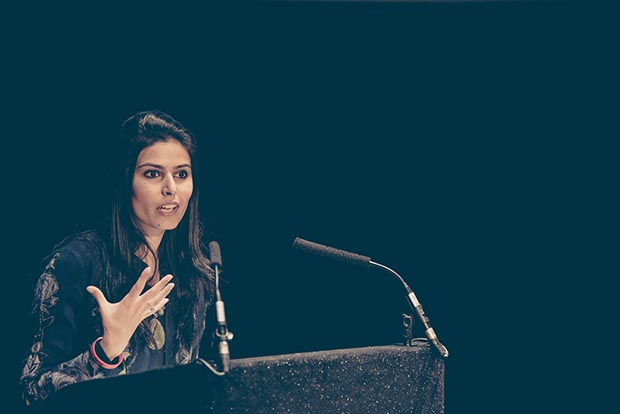
Farieha Aziz, director of 2016 Freedom of Expression Campaigning Award winner Bolo Bhi (Photo: Elina Kansikas for Index on Censorship)
The cyber crimes bill passed by Pakistan’s lower legislative chamber is unacceptable and needs major changes, Bolo Bhi told Index on Censorship.
Fareiah Aziz, director of Bolo Bhi, said the group is ready to pick up the fight against the Prevention of Electronic Crimes Act, which was passed by Pakistan’s National Assembly on Wednesday 13 April. The bill must now be approved by the senate.
“We need the senate to change the bill significantly, if not completely,” Aziz said. “A few amendments are not going to be enough.”
Aziz was in London for the Index on Censorship 2016 Freedom of Expression Awards, where she accepted the Campaigning Award on behalf of Bolo Bhi.
The bill, which stems from the 20-point National Action Plan against terrorism prime minister Nawaz Sharif announced after the Peshawar attack and was presented to the national assembly by an expert committee established by the standing committee for IT, has caused uproar in civil society for its restrictions of human rights and free speech.
According to Bolo Bhi, some of the major concerns are the criminalisation of political criticism and political expression; the overreaching and discretionary powers given to the media regulator; the harsh punishments and fines for hate speech; and the lack of protection for journalists and of adequately set procedures.
Additionally, the group has also lamented a critical lack of transparency in the drafting process, claiming the government deliberately avoided making the proposed text available to the public.
According to Dawn, the bill also shows a critical lack of IT expertise.
Aziz told Index on Censorship that Bolo Bhi expected the bill to be approved by the national assembly, and has been lobbying the senate since August 2015.
“We already have commitments from senators, including the chairman, who said very publicly in one of the sessions that this bill is not going to pass in its current version.”
“The senate is more balanced, and the opposition has the majority, whereas the government has a 2/3 majority in the national assembly,” she said.
However, Aziz warned the greatest risk is that senators settle for a few amendments to the bill instead of changing everything that needs changing.
“It’s the oldest trick in the book,” she said. “Make changes here and there, accept a few amendments, and then say that you’ve done what you could do. But that’s not going to be enough.
“We’ve seen this before with the introduction of military courts and the Protection of Pakistan Bill 2014. There was always an outcry by opposition parties, especially about the Protection of Pakistan Bill, but then they settled for a few amendments and all went through.”
Aziz said Bolo Bhi is already working to organise public and academic debate around the bill, and to make sure the senate has a clause by clause discussion.
Bolo Bhi, which means “speak up” in urdu, has been fighting the bill for over a year. They have been lobbying with members of the opposition and other organisations against the bill since then, shedding light on the legislation, organising public debates and creating a timeline tracking cybercrime legislation with information on every development.
Salient features of bill, according to Dawn:
- Up to five year imprisonment, $95.000 fine or both for hate speech, or trying to create disputes and spread hatred on the basis of religion or sectarianism.
- Up to five year imprisonment, $48.000 fine or both for transferring or copying of sensitive basic information.
- Up to $480 fine for sending messages irritating to others or for marketing purposes. If the crime is repeated, the punishment would be three months imprisonment and a fine of up to $9.500.
- Up to three year imprisonment and a fine of up to £4.800 for creating a website for negative purposes.
- Up to one year imprisonment or a fine of up to $9.500 for forcing an individual for immoral activity, or publishing an individual’s picture without consent, sending obscene messages or unnecessary cyber interference.
- Up to seven year imprisonment, a fine of $95.000 or both for interfering in sensitive data information systems.
- Three month imprisonment or a $480 fine or both for accessing unauthorised data.
- Three year imprisonment and a fine of up to $48.000 for obtaining information about an individual’s identification, selling the information or retaining it with self.
- Up to three year imprisonment and a fine of up to $4.800 for issuing a sim card in an unauthorised manner.
- Up to three year imprisonment and fine of up to $9.500 for making changes in a wireless set or a cell phone.
- Up to three year imprisonment and a fine of up to $9.500 for spreading misinformation about an individual.
19 Apr 2016 | Azerbaijan, Azerbaijan Letters, Campaigns, Europe and Central Asia, mobile, Statements
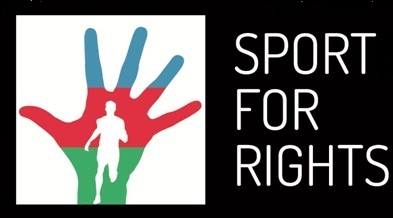
Dear Mr Williams,
We are writing to you as members of the Sport for Rights campaign, which has been working to raise human rights violations in Azerbaijan in the run-up to the Formula One European Grand Prix. We are deeply disappointed by your decision to perform in Baku on 19 June in connection with the European Grand Prix, given the dire human rights situation in the country. We urge you to take a stand for human rights in Azerbaijan and cancel your Baku performance.
We have observed your support for the respect for the fundamental freedoms of all people, such as your comments at the United Nations on the International Day of Happiness last March, where you stated, “Happiness is your birthright”. You spoke out again in October dedicating your song “Freedom” to the refugee crisis in Europe, saying, “Freedom is something you’re born with. No one has to give it to you”.
Unfortunately, that is not the case for the people of Azerbaijan, whose rights have not been respected or protected. Although 16 political prisoners were recently released, dozens still languish in Azerbaijani jails, including journalists, bloggers, youth activists, politicians, and religious followers guilty of nothing more than disagreeing with the government. Despite the fact that they never should have spent a single day in jail, the released prisoners have not been rehabilitated, still under legal restrictions that impede their work and their lives, with some facing travel bans preventing them from accessing urgently needed medical attention. More broadly, civil society is attempting to work in nearly impossible conditions, and a number of NGOs face politically motivated criminal investigations. Journalists operate in a climate of fear, in a media environment dominated by the state, where violent attacks – even murders – against critical voices are committed with impunity.
Among Azerbaijan’s political prisoners is Khadija Ismayilova, a courageous investigative journalist targeted for exposing corruption of the ruling elite through stories that are continuing to unravel through the Panama Papers leak. Another journalist, Seymur Hezi, is jailed on trumped-up hooliganism charges, following years of pressure against him, such as being abducted and tortured, and warned to stop criticising Azerbaijani President Ilham Aliyev. Opposition leader Ilgar Mammadov, who attempted to challenge Aliyev’s presidency in 2013, has been imprisoned for over three years, and has reported being repeatedly tortured. Youth activist Ilkin Rustemzade has also been jailed for more than three years, initially arrested in connection with a “Harlem Shake” video filmed in Baku.
As with previous prestige events, the Azerbaijani authorities are using the European Grand Prix in an attempt to whitewash their image, to distract international attention from the human rights abuses taking place in the country. Whether or not it is your intention, your performance would be used as part of that cover-up, as propaganda for an increasingly authoritarian government. Although you hope for your music to bring happiness to people all over the world, a performance in Azerbaijan would serve to further the suffering of the country’s political prisoners, and the many others whose rights have been violated by the very government that will profit from the European Grand Prix.
But you still have the chance to make this right. We urge you to cancel your Baku performance, and to speak out publicly, condemning the human rights crackdown in Azerbaijan, and calling for the immediate and unconditional release of political prisoners.
We call your attention to comments made by U2 lead singer Bono on stage in Montreal last June, on the night of the opening ceremony of the European Games in Baku. Bono specifically named six Azerbaijani political prisoners, displayed their photos in the arena, and conveyed a message to President Aliyev: “If anything happens to one of our friends, we will hold you responsible!” Five of the prisoners he named have since been released. We believe that you taking a strong stand for human rights could also have a significant impact.
Please, have some compassion for these courageous people, imprisoned for speaking the truth and trying to change the situation in Azerbaijan for the better. Show the world that you care, and that your silence cannot be bought.
Sincerely yours,
Rebecca Vincent, Coordinator, Sport for Rights campaign
Mike Harris, Director, 89up
Thomas Hughes, Executive Director, ARTICLE 19
Alice Klein, President, Canadian Journalists for Free Expression
Nina Ognianova, Europe and Central Asia Program Coordinator, Committee to Protect
Journalists
Maran Turner, Executive Director, Freedom Now
Danuta Przywara, President of the Board, Helsinki Foundation for Human Rights
Florian Irminger, Head of Advocacy, Human Rights House Foundation
Melody Patry, Senior Advocacy Officer, Index on Censorship
Emin Huseynov, Director, Institute for Reporters’ Freedom and Safety
Karim Lahidji, President, International Federation for Human Rights (FIDH)
Brigitte Dufour, Director, International Partnership for Human Rights
James Marriott, Co-Director, Platform
Petra Havlikova, Project Coordinator of the Women’s Rights Are Human Rights
Program, NESEHNUTI
Berit Lindeman, Senior Advisor, Norwegian Helsinki Committee
Karin Karlekar, Director, Free Expression Programs, PEN America
Ivana Skalova, Head of the East European Program, People in Need
Aleksandra Antonowicz-Cyglicka, Head of Programme, Action for the Global
South, Polish Green Network
Gerald Staberock, Secretary General, World Organisation Against Torture (OMCT)
Łukasz Biernacki, Managing Director, You Aid Foundation
Dear Mr Iglesias,
We are writing to you as members of the Sport for Rights campaign, which has been working to raise human rights violations in Azerbaijan in the run-up to the Formula One European Grand Prix. We are deeply disappointed by your decision to perform in Baku on 18 June in connection with the European Grand Prix, given the dire human rights situation in the country. We urge you to take a stand for human rights in Azerbaijan and cancel your Baku performance.
We have observed your support for charitable causes, including Save the Children, which advocates the promotion and protection of human rights. Unfortunately, the human rights of the people of Azerbaijan have not been respected or protected. Although 16 political prisoners were recently released, dozens still languish in Azerbaijani jails, including journalists, bloggers, youth activists, politicians, and religious followers guilty of nothing more than disagreeing with the government. Despite the fact that they never should have spent a single day in jail, the released prisoners have not been rehabilitated, still under legal restrictions that impede their work and their lives, with some facing travel bans preventing them from accessing urgently needed medical attention. More broadly, civil society is attempting to work in nearly impossible conditions, and a number of NGOs face politically motivated criminal investigations. Journalists operate in a climate of fear, in a media environment dominated by the state, where violent attacks – even murders – against critical voices are committed with impunity.
Among Azerbaijan’s political prisoners is Khadija Ismayilova, a courageous investigative journalist targeted for exposing corruption of the ruling elite through stories that are continuing to unravel through the Panama Papers leak. Another journalist, Seymur Hezi, is jailed on trumped-up hooliganism charges, following years of pressure against him, such as being abducted and tortured, and warned to stop criticising Azerbaijani President Ilham Aliyev. Opposition leader Ilgar Mammadov, who attempted to challenge Aliyev’s presidency in 2013, has been imprisoned for over three years, and has reported being repeatedly tortured. Youth activist Ilkin Rustemzade has also been jailed for more than three years, initially arrested in connection with a “Harlem Shake” video filmed in Baku.
As with previous prestige events, the Azerbaijani authorities are using the European Grand Prix in an attempt to whitewash their image, to distract international attention from the human rights abuses taking place in the country. Whether or not it is your intention, your performance would be used as part of that cover-up, as propaganda for an increasingly authoritarian government. A performance in Azerbaijan would serve to further the suffering of the country’s political prisoners, and the many others whose rights have been violated by the very government that will profit from the European Grand Prix.
But you still have the chance to make this right. We urge you to cancel your Baku performance, and to speak out publicly, condemning the human rights crackdown in Azerbaijan, and calling for the immediate and unconditional release of political prisoners.
We call your attention to comments made by U2 lead singer Bono on stage in Montreal last June, on the night of the opening ceremony of the European Games in Baku. Bono specifically named six Azerbaijani political prisoners, displayed their photos in the arena, and conveyed a message to President Aliyev: “If anything happens to one of our friends, we will hold you responsible!” Five of the prisoners he named have since been released. We believe that you taking a strong stand for human rights could also have a significant impact.
Please, have some compassion for these courageous people, imprisoned for speaking the truth and trying to change the situation in Azerbaijan for the better. Show the world that you care, and that your silence cannot be bought.
Sincerely yours,
Rebecca Vincent, Coordinator, Sport for Rights campaign
Mike Harris, Director, 89up
Thomas Hughes, Executive Director, ARTICLE 19
Alice Klein, President, Canadian Journalists for Free Expression
Nina Ognianova, Europe and Central Asia Program Coordinator, Committee to Protect
Journalists
Maran Turner, Executive Director, Freedom Now
Danuta Przywara, President of the Board, Helsinki Foundation for Human Rights
Florian Irminger, Head of Advocacy, Human Rights House Foundation
Melody Patry, Senior Advocacy Officer, Index on Censorship
Emin Huseynov, Director, Institute for Reporters’ Freedom and Safety
Karim Lahidji, President, International Federation for Human Rights (FIDH)
Brigitte Dufour, Director, International Partnership for Human Rights
James Marriott, Co-Director, Platform
Petra Havlikova, Project Coordinator of the Women’s Rights Are Human Rights
Program, NESEHNUTI
Berit Lindeman, Senior Advisor, Norwegian Helsinki Committee
Karin Karlekar, Director, Free Expression Programs, PEN America
Ivana Skalova, Head of the East European Program, People in Need
Aleksandra Antonowicz-Cyglicka, Head of Programme, Action for the Global
South, Polish Green Network
Gerald Staberock, Secretary General, World Organisation Against Torture (OMCT)
Łukasz Biernacki, Managing Director, You Aid Foundation
Dear Mr Brown,
We are writing to you as members of the Sport for Rights campaign, which has been working to raise human rights violations in Azerbaijan in the run-up to the Formula One European Grand Prix. We are deeply disappointed by your decision to perform in Baku on 17 June in connection with the European Grand Prix, given the dire human rights situation in the country. We urge you to take a stand for human rights in Azerbaijan and cancel your Baku performance.
Azerbaijan is in the midst of an unprecedented human rights crackdown. Although 16 political prisoners were recently released, dozens still languish in Azerbaijani jails, including journalists, bloggers, youth activists, politicians, and religious followers guilty of nothing more than disagreeing with the government. Despite the fact that they never should have spent a single day in jail, the released prisoners have not been rehabilitated, still under legal restrictions that impede their work and their lives, with some facing travel bans preventing them from accessing urgently needed medical attention. More broadly, civil society is attempting to work in nearly impossible conditions, and a number of NGOs face politically motivated criminal investigations. Journalists operate in a climate of fear, in a media environment dominated by the state, where violent attacks – even murders – against critical voices are committed with impunity.
Among Azerbaijan’s political prisoners is Khadija Ismayilova, a courageous investigative journalist targeted for exposing corruption of the ruling elite through stories that are continuing to unravel through the Panama Papers leak. Another journalist, Seymur Hezi, is jailed on trumped-up hooliganism charges, following years of pressure against him, such as being abducted and tortured, and warned to stop criticising Azerbaijani President Ilham Aliyev. Opposition leader Ilgar Mammadov, who attempted to challenge Aliyev’s presidency in 2013, has been imprisoned for over three years, and has reported being repeatedly tortured. Youth activist Ilkin Rustemzade has also been jailed for more than three years, initially arrested in connection with a “Harlem Shake” video filmed in Baku.
As with previous prestige events, the Azerbaijani authorities are using the European Grand Prix in an attempt to whitewash their image, to distract international attention from the human rights abuses taking place in the country. Whether or not it is your intention, your performance would be used as part of that cover-up, as propaganda for an increasingly authoritarian government. A performance in Azerbaijan would serve to further the suffering of the country’s political prisoners, and the many others whose rights have been violated by the very government that will profit from the European Grand Prix.
But you still have the chance to make this right. We urge you to cancel your Baku performance, and to speak out publicly, condemning the human rights crackdown in Azerbaijan, and calling for the immediate and unconditional release of political prisoners.
We call your attention to comments made by U2 lead singer Bono on stage in Montreal last June, on the night of the opening ceremony of the European Games in Baku. Bono specifically named six Azerbaijani political prisoners, displayed their photos in the arena, and conveyed a message to President Aliyev: “If anything happens to one of our friends, we will hold you responsible!” Five of the prisoners he named have since been released. We believe that you taking a strong stand for human rights could also have a significant impact.
Please, have some compassion for these courageous people, imprisoned for speaking the truth and trying to change the situation in Azerbaijan for the better. Show the world that you care, and that your silence cannot be bought.
Sincerely yours,
Rebecca Vincent, Coordinator, Sport for Rights campaign
Mike Harris, Director, 89up
Thomas Hughes, Executive Director, ARTICLE 19
Alice Klein, President, Canadian Journalists for Free Expression
Nina Ognianova, Europe and Central Asia Program Coordinator, Committee to Protect
Journalists
Maran Turner, Executive Director, Freedom Now
Danuta Przywara, President of the Board, Helsinki Foundation for Human Rights
Florian Irminger, Head of Advocacy, Human Rights House Foundation
Melody Patry, Senior Advocacy Officer, Index on Censorship
Emin Huseynov, Director, Institute for Reporters’ Freedom and Safety
Karim Lahidji, President, International Federation for Human Rights (FIDH)
Brigitte Dufour, Director, International Partnership for Human Rights
James Marriott, Co-Director, Platform
Petra Havlikova, Project Coordinator of the Women’s Rights Are Human Rights
Program, NESEHNUTI
Berit Lindeman, Senior Advisor, Norwegian Helsinki Committee
Karin Karlekar, Director, Free Expression Programs, PEN America
Ivana Skalova, Head of the East European Program, People in Need
Aleksandra Antonowicz-Cyglicka, Head of Programme, Action for the Global
South, Polish Green Network
Gerald Staberock, Secretary General, World Organisation Against Torture (OMCT)
Łukasz Biernacki, Managing Director, You Aid Foundation
18 Apr 2016 | Magazine, mobile, Volume 45.01 Spring 2016
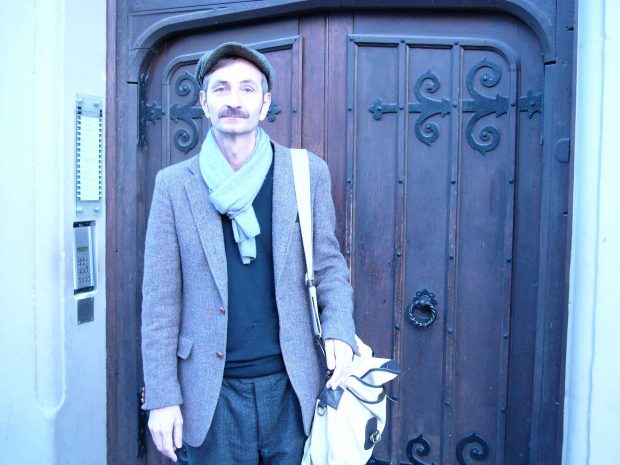
Poet Edin Suljic was inspired to write My Mate Shakespeare after a recent trip to his home country
My Mate Shakespeare
The first time I met Shakespeare, he looked nothing like himself, nothing like that
depiction of a poster boy with a hipster beard one comes across every so often.
No, he was tall, scrawny, flamboyant, thin-moustached and bespectacled, with large
hands into which his guitar almost disappeared as he sang perched on a low
stool, in the theatre’s green room, where we would occasionally be allowed to
sneak into as aspiring writers and actors, to join the post-press-night party.
In those days we shared many breakfasts, mainly a coffee and cigarettes, and
sometimes a boiled egg given to us by a kind cook in the theatre’s canteen.
And our fortunes took many turns …
Some claimed his work as if it was their own, they complained about too many foreigners
in his plays (As if we don’t have our own trulls – they’d say). Others even claimed he
never wrote anything, or worse, that he never existed. My mate Shakespeare …
Every so often he’d ask me if I am still writing, then say:
– Keep writing, keep writing, me duck …
But then, he ripped apart my first play.
That’s too serious boyo – he said, and inserted an innuendo into every second paragraph.
He was madly in love with this blonde, petite, round-eyed actress who was patiently
waiting for her lucky break on stage, and for him to come to her garret.
Almost addicted to bingo and drinking a lot of poor-quality brandy, he got himself into
many troubles by attacking so many kings, offending so many celebrities and ridiculing
politicians; and he wrote too many plays about deformity and cross dressing.
Even his small girlfriend turned out to be a man in disguise.
Then the war tore everything apart, and I haven’t seen him since.
The world entered into this never-ending war.
I heard the stories … He married a very different girl and they had two beautiful
children and they lived somewhere in the outskirts of the City.
He doesn’t go to the theatre anymore.
But then, like most stories about him, these too, turned out to be unreliable.
I saw him once more – in the East End. That last time I saw him, he
looked like a broken man. My friend. My indestructible friend.
Something or somebody managed to do it to him.
I suppressed a cry inside myself. What is left for the rest of us? What
will happen to us if people like him could be broken?
Then he leaned over his glass of cheap brandy and whispered
– Keep writing, keep writing, boyo …

Spring 2016 cover
Read an interview with Suljic in the latest magazine. This Saturday (April 23) marks the 400th anniversary of Shakespeare’s death. To commemorate this, the spring issue of Index on Censorship magazine is a Shakespeare and protest special, featuring pieces that explore how the bard’s plays have been used to circumvent censorship and tackle difficult issues around the world; from Bollywood adaptions to Othello in apartheid-era South Africa and a ground-breaking recent performance of Romeo and Juliet between Kosovan and Serbian theatres, along with reports on theatre upsetting people in the USA, and interviews with directors around the world. Historian Tom Holland writes about how a Middle Eastern performance of Measure for Measure would hit the spot, and playwright Elizabeth Zaza Muchemwa on how Shakespeare sneaks tricky debates into Zimbabwean culture.
Order your full-colour print copy of our Shakespeare magazine special here, or take out a digital subscription from anywhere in the world via Exact Editions (just £18* for the year). Each magazine sale helps Index on Censorship fight for free expression worldwide.
*Will be charged at local exchange rate outside the UK.
Magazines are also on sale in bookshops, including at the BFI and MagCulture in London, News from Nowhere in Liverpool and Home in Manchester; as well as on Amazon and iTunes. MagCulture will ship to anywhere in the world.
15 Apr 2016 | About Index, Awards, Fellowship, Fellowship 2016, News and features
Words by Alessio Perrone and Sean Gallagher
Photos: Sean Gallagher
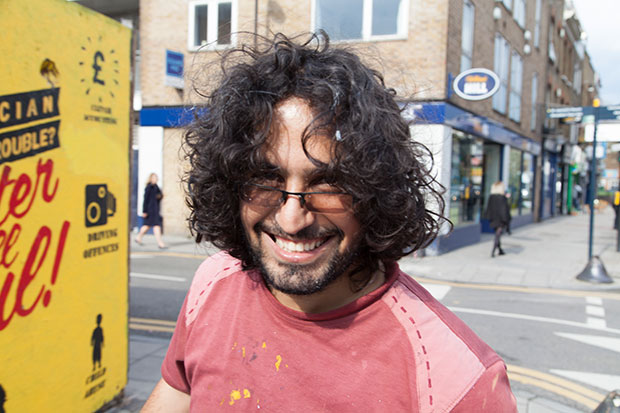
“I invite people like this: I just say – you paint now.” That’s how it works with street artist Murad Subay.
His murals grew from the frustration he felt as his homeland, Yemen, descended into chaos and factionalism. Amid the destruction and anger, Subay picked up his brush. With friends, he went out into the streets and began painting in broad daylight. Days passed, then people from the community joined him. All of them driven by their desire for peace amid Yemen’s civil war.
Since 2011 he’s created campaigns to encourage Yemenis to express their outrage at what their country has become. He and his collaborators have coloured walls, named the disappeared and marked ruins.
He always works during the day. It’s always part performance, part collaboration. Thursday 14 April was no different. Only the location had changed.
For his first mural outside Yemen, Subay took his brushes and paint to the corner of Hackney Road and Cremer Street to send a pointed message about the international community’s lack of humanity, especially toward his homeland. Even dogs are better than some of the global institutions and structures.
In London, to receive the 2016 Freedom of Expression Arts Award for his work, which Subay stressed is for Yemen. His acceptance speech was dedicated to the “unknown people who struggle to survive”.
Invited by Jay, the community curator of Art Under the Hood, Subay set up his equipment — with the help of new friends — and began transforming a hoarding into his vision using stencils he had laboured over since arriving on Saturday.
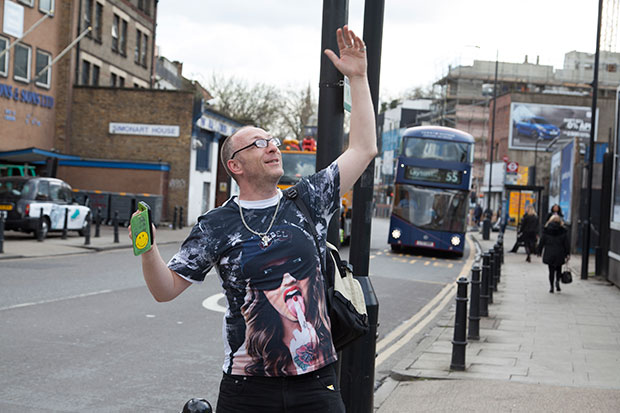
“I’m doing a sun dance.”
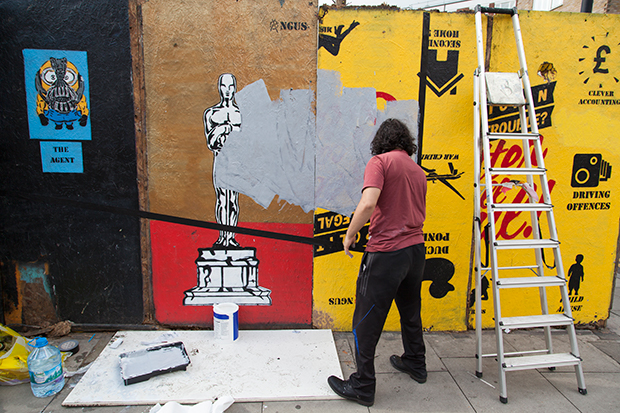
“I’m not the type of artist who zones out and thinks this is precious. It’s an ordinary thing for me”
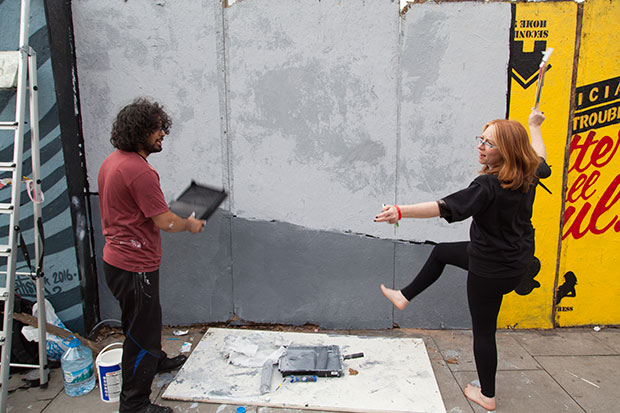
“How long will it take for it to dry?”
“In Sana’a, three minutes!” Then a few seconds later “Here, I don’t know”
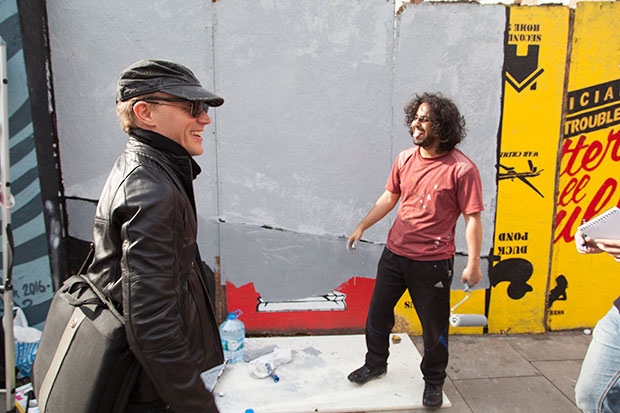
“Do you want me to do anything”
“Yes of course. Come here”
“Welcome to the holy state of Hackney, my friend. This is not a borough, not a city, it’s a state.”
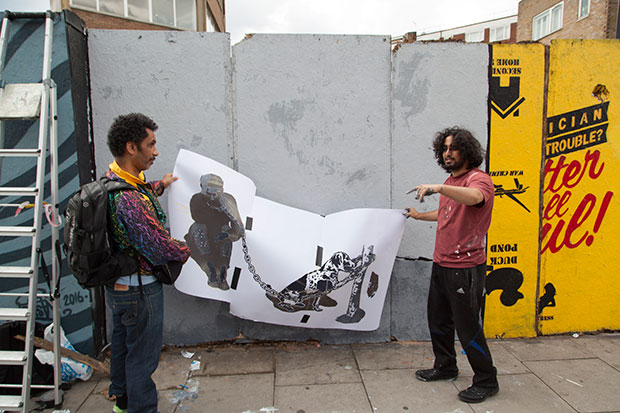
“I’ve worked on these stencils from time to time for four days. It’s hard to say how long it takes. Sometimes it takes three, four hours, other times five … Depends on what I do”
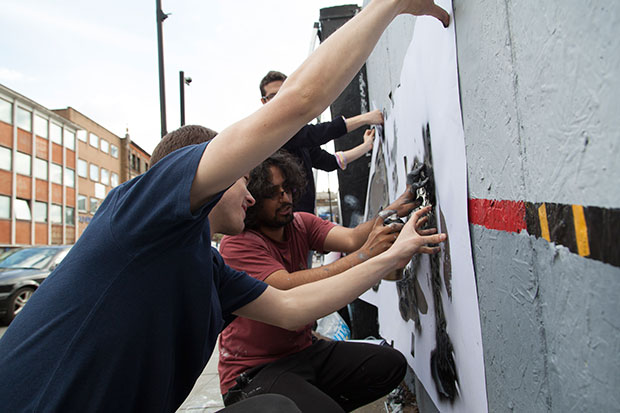
“First, try it on the cardboard to see how strong or light it is. Then press in the shape, light, not strong. Keep it at an angle close to the margins, so you can make sure you don’t spray outside the shape. Then perpendicular in the middle. Keep it light, light!”
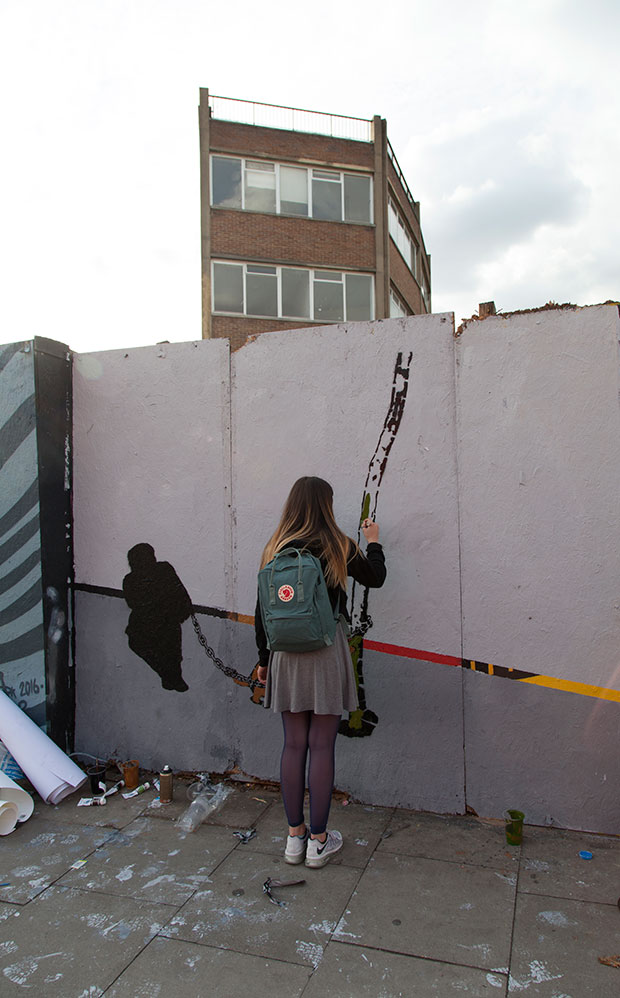
“Can I have a go?” a young woman asks.
“Yes of course!”
She stops for a moment, hesitant. Then she ends up staying until the very end. And in the end, Subay gives her, Éléa, the stencils when he finishes the mural.
“Do you paint?”
“A bit”
“Not a bit, you have to paint a lot! Painting is beautiful.”
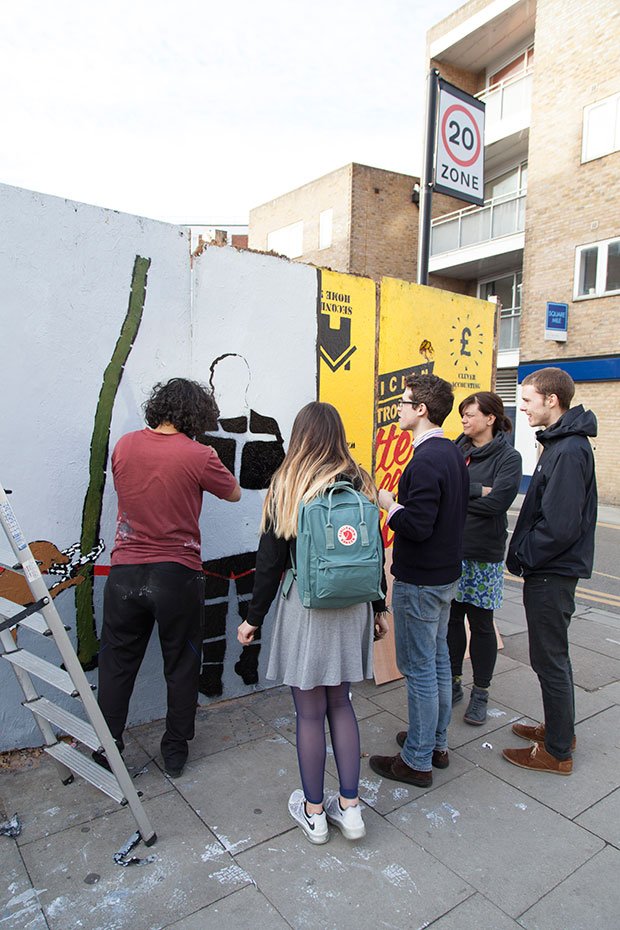
“They have artists in Yemen? First time I hear that!”
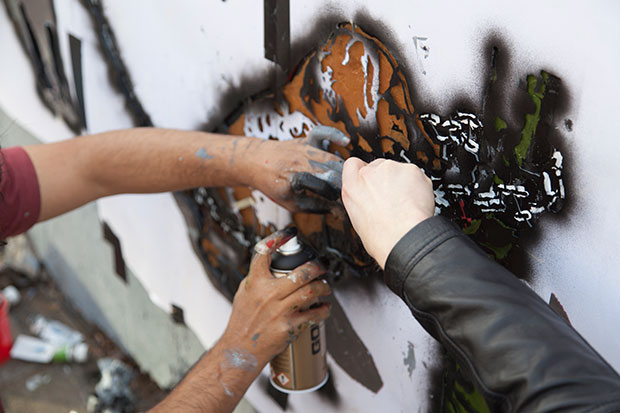
“You know how to spray right? Come and learn a bit!”
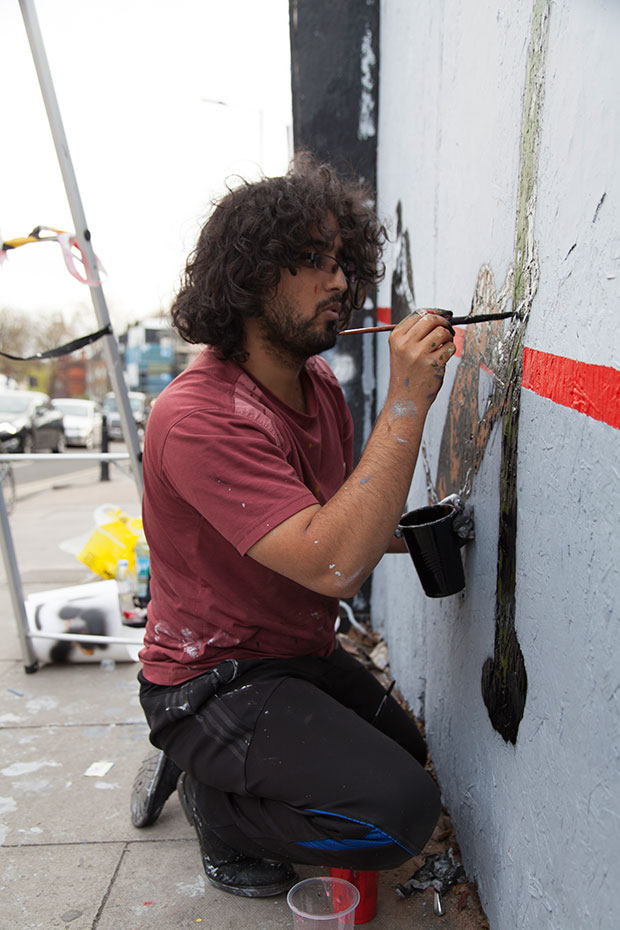
“When I started out, I was alone, and I did it all in one week. I am slow. In the beginning, I never thought people could join. But then they did. They say: ‘Oh look, the artist!’ And they join”
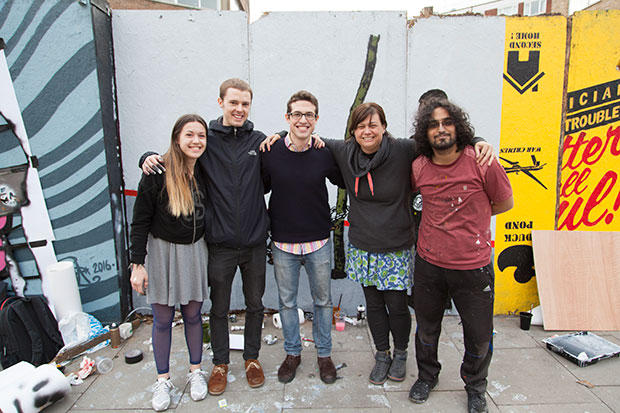
“These stencils, I made in Yemen. I staged a photo, printed it, then cut it out. That chained man is one of my relatives. He’s a very nice person. He jokes a lot and loves painting. I really like him. We work together a lot, on street art of course but also many different things.”
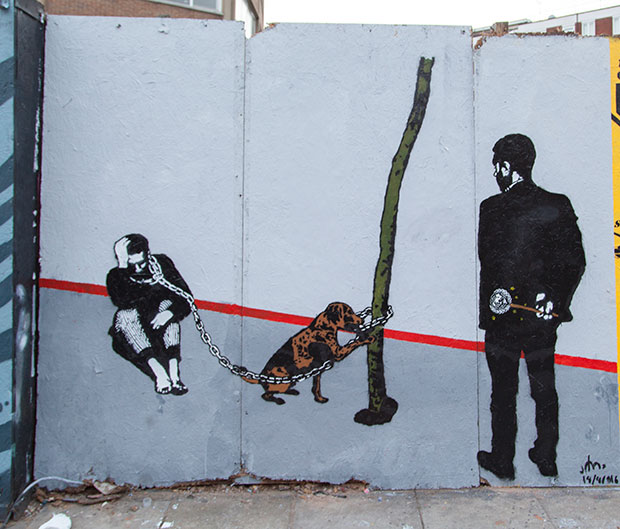
“It’s all about how the man is suffering. He’s not just Yemen or anybody in particular. It could be any man. The dog is trying to help, and is showing more kindness then the other man. The dog shows that it’s possible to help out, but the other man doesn’t want to do anything.”

















